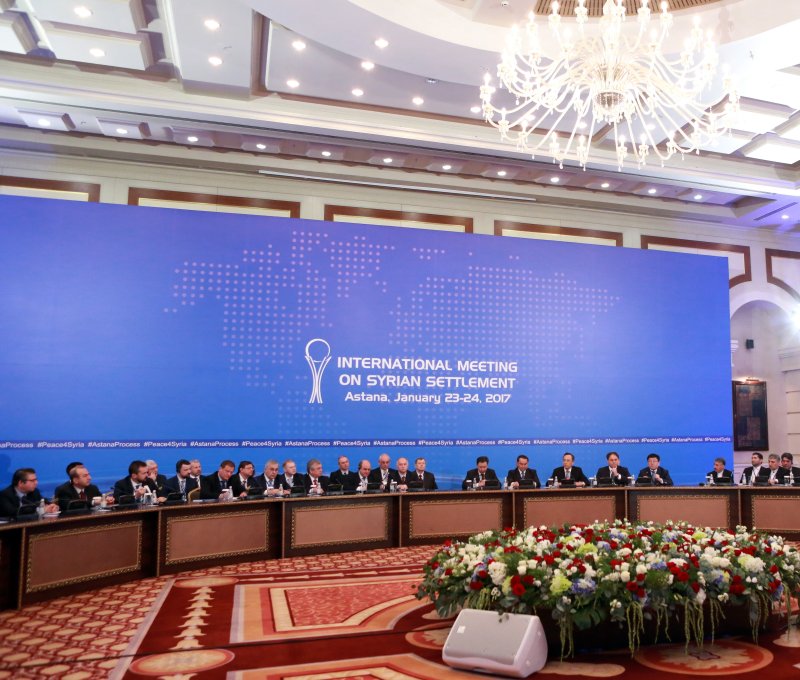Representatives of Russia, Turkey and Iran meet to talk about the Syrian conflict in Astana, Kazakhstan, on Monday. The representatives are meeting until Tuesday with the aim of strengthening a cease-fire that has largely held despite incidents of violence across Syria between the regime of President Bashar al-Assad and the Syrian rebels. Photo by Igor Kovalenko/European Pressphoto Agency
Jan. 23 (UPI) -- Peace talks over the Syrian civil war began on Monday in Astana, the capital of Kazakhstan, starting with the first face-to-face meeting between Syrian rebels and President Bashar al-Assad's regime in nearly six years.
The Syrian opposition said at the meeting it would not hold direct negotiations with Assad's representatives, however, citing continued bombardments and attacks in violation of a cease-fire agreement. The peace negotiations aimed at bringing an end to the nearly six-year civil war are brokered by Russia and Iran, which support Assad, as well as Turkey, which supports rebel forces.
"If there is seriousness in making these talks lead to something substantial, formality won't be that important," rebel spokesman Yahya al-Aridi told Al Jazeera. "We haven't seen any signs of commitment to the cease-fire; there should be clarity and agreement on this first."
The talks opened with the two opposing sides seated at a large conference table but the conversations devolved quickly into name-calling and accusations.
The Syrian regime also accused the rebels -- which it called "terrorists" -- of violating the cease-fire established in late December, which was brokered by Russia and Turkey. The shared accusations of cease-fire violations center on the area of Wadi Barada, an area near Damascus in which a major water facility is located.
The two groups were brought into separate rooms with United Nations Envoy Staffan de Mistura carrying messages back and forth between the groups of representatives. Despite the rocky start to the talks that will end Tuesday, the head of the rebel delegation, Mohammad Alloush, said the opposition is "ready to go to the ends of the earth" to end the Syrian crisis.
Turkish Deputy Prime Minister Numan Kurtulmus said a resolution to the Syrian crisis should not be expected immediately. "There are parties that have been at war with each other for six years around the table at Astana," Kurtulmus said. "A solution in one or two days should not be expected."
The main goal of talks in Kazakhstan is to preserve and strengthen the ceasefire currently in effect in Syria, which has not been followed by either side. Russia pointed at violations of the truce by Syrian government forces, while water supplies for Damascus have been cut off for weeks because issues in the rebel-controlled city of Wadi Barada that both sides blame each other for.
"In a best-case scenario, you get increased humanitarian access to besieged areas accompanied by a beefed up cease-fire enhancement mechanism to be monitored by the three external actors [Russia, Turkey and Iran]," Julien Barnes-Dacey, senior policy fellow at the European Council on Foreign Relations, told ABC News.
Once the ceasefire is solidified, experts said, the rest of the world will need to get involved to focus on longer-term solutions for Syria, including rebuilding the battered nation and decided what to do about President Bashar al-Assad's presidency.
Peace talks mediated by the United Nations in Geneva over Syria are scheduled to begin Feb. 8. The Islamic State, which holds territory in Syria including its self-declared capital of Raqqa, is excluded from peace negotiations and from cease-fire agreements.















